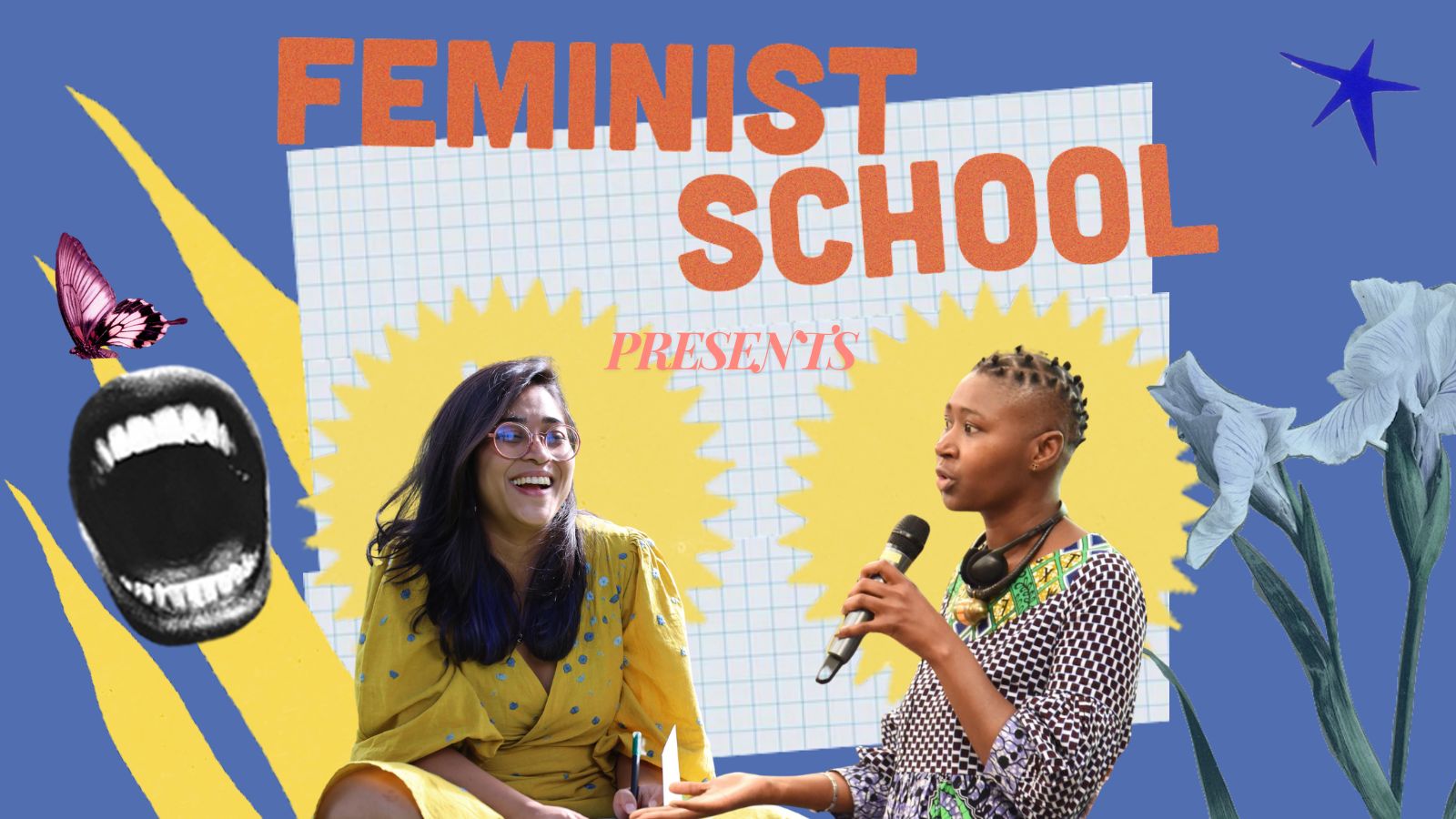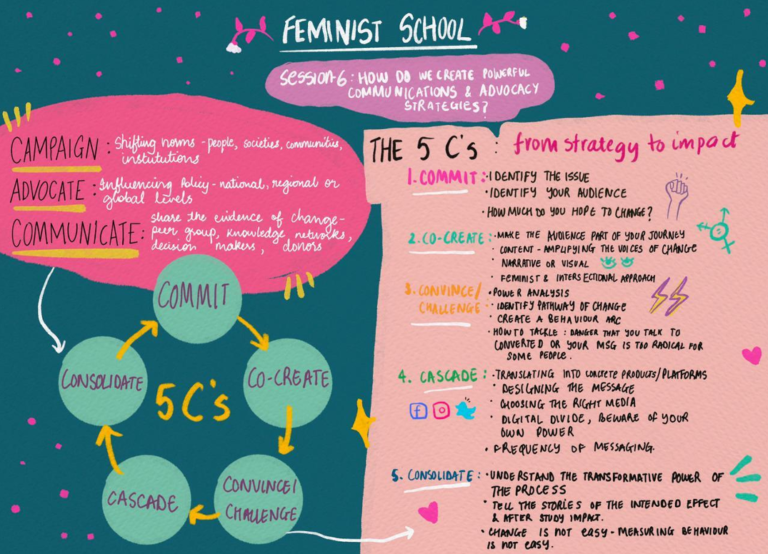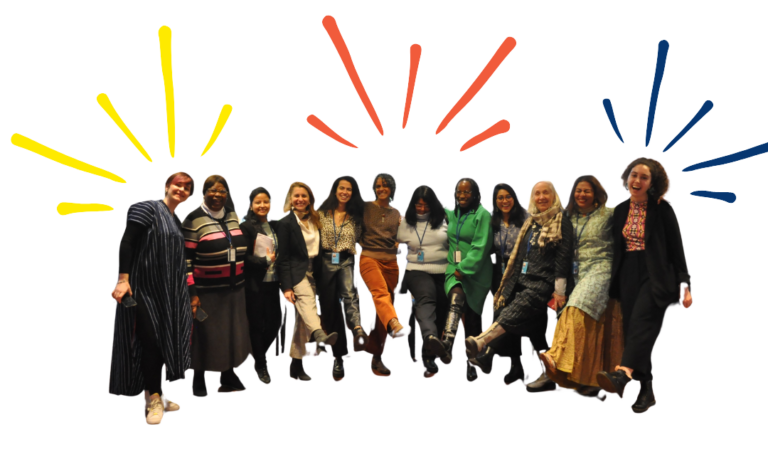 Mariana: How would you describe Feminist School in three words?
Mariana: How would you describe Feminist School in three words?
Aayushi: Fabulous, fabulous, fabulous! It’s also celebratory, provocative, and supportive.
Khanysa: It’s definitely provocative. Necessary. And I’d also say it’s energising. I like what Aayushi said, especially the celebratory part. It speaks to why Feminist School is relevant today: many historical discriminations still persist, and feminism speaks to these and suggests approaches to challenge and address them.
In addition, we often focus on what hasn’t been achieved and don’t celebrate enough what has. Activists have already said this – we can feel in our bones that the progress we’ve made isn’t guaranteed to last. Everything can be reversed. In this context, celebrating becomes even more essential because we don’t know what tomorrow may bring. A government could arise and reverse those achievements. It’s important to remember that it’s not just about fighting, fighting, fighting; it’s also about celebrating. Celebrating what we’ve achieved, celebrating who we are, and celebrating our dreams.
We often focus on what hasn’t been achieved and don’t celebrate enough what has. It’s important to remember that it’s not just about fighting, fighting, fighting; it’s also about celebrating. Celebrating what we’ve achieved, celebrating who we are, and celebrating our dreams.
Mariana: Can you tell us about the story of Feminist School?
Aayushi: To date, we’ve completed three editions of Feminist School and are planning the fourth, which will launch soon. The pilot happened in 2021, during the pandemic. UNGEI and Gender at Work had already been working together for years on education and school-related gender-based violence. At that time, we were still at home, learning to work and live our activism online. Natasha Harris-Harb from UNGEI, who runs the Transform Education initiative, saw the need to foster connections and collaboration within the community she was working with. In that context, we launched the pilot with young education activists across the globe.
We had incredible participants from everywhere. It was an opportune moment to experiment and try new things. What unfolded was quite incredible and a big surprise to me, Natasha, and Rex Fyles, the team that developed the pilot. We were able to create a kind of magic during that cohort. In hindsight, I see now that intergenerational collaboration practices played a significant role. I brought some of my skills in communications and design to complement the different skills Rex and Natasha brought. We were learning with and from each other, which really helped create the space. We all had different pieces of the puzzle, and we were open to seeing what worked and what didn’t.

Another interesting aspect of the pilot is that it wasn’t part of a planned project. We weren’t funded at the start; the three of us simply decided to try things out. Only after the pilot did we secure funding for implementation. This gave us the freedom to experiment without feeling pressured to deliver, allowing us to create a space where we could genuinely enjoy being together with the young activists, who also entered the space fully and openly. The world was burning, but we had this space we could retreat to.
We also invited other ‘Gender at Workers’ to join us and facilitate different sections as guests. For example, we invited Nina Benjamin to talk about patriarchal binaries and power, Joanne Sandler to discuss the ‘five Ps’ [power, purpose, practices, and principles] and share reflections on people’s journeys, Vijaya Nidadavolu to offer tools around advocacy and communications, and Michal Friedman to talk about power. These diverse contributors co-created the space with us.
Then, we were asked to document the learnings and results, something we hadn’t originally considered. It turned out that the project worked well not just for us but for the participants too. Beyond simply enjoying the space, we were all able to learn collectively, and that’s how the partnership with UNGEI and Gender at Work to co-create Feminist School evolved.
In the second edition, which involved civil society activists, Eleanor du Plooy, another Associate at Gender at Work, joined the team and brought her mind-body work and aesthetics into the planning. Khanysa also joined, bringing her brilliance and experience. From there, we’ve continued building and learning from each edition. Our approach evolves with the needs of different people and the team.
Natasha and I have often talked about our vision for Feminist School, which we imagine as spider webs spreading across the world in different pockets. There’s been a Feminist School for young activists, one for civil society actors, one for education civil society organisations, one for young adolescent girls, and more are coming. We hope these webs will eventually connect and foster a community of reflection and love, leading to collective change.
Khanysa: To add, Feminist School also has a flexible and adaptable frame, centred on the ‘five Ps’ of feminist leadership. For those unfamiliar, Srilatha Batliwala suggested ‘four Ps‘: power, purpose, practices, and principles. Joanne Sandler later added a fifth P for partnerships. The content of Feminist School revolves around these ‘Ps’, encouraging participants to connect with their power, purpose, principles, practice, and partnerships in moving their agendas forward. This reflects how feminist thinking can contribute to changing the status quo and achieving social justice.
“There has been a Feminist School for young activists, one for civil society actors, one for education civil society organisations, one for young adolescent girls, and more are coming. We hope these webs will eventually connect and foster a community of reflection and love, leading to collective change.”
Mariana: That’s a great overview of the ‘institutional’ story of Feminist School. I’d also love to hear about your personal journeys with it. How did you get involved, and what excites you most about being part of a project like this?
Khanysa: For me, it is a continuation of supporting activists in understanding the structures they’re fighting. Feminist School offers an opportunity to help activists expand their view of the issues they’re tackling, and that’s exciting for me personally, as I’m an activist myself.
The idea that we’re planting seeds in our global context to build the world we want to live in is also exciting. It reminds me of Lilla Watson’s quote, ‘If you have come to help me, you are wasting your time. But if you have come because your liberation is bound up with mine, then let us work together.’ Even though we’re working with activists in places I’ve never been, their success in transforming patriarchal, homophobic, and other structural inequalities will eventually impact me too. And if I can transform things in my environment, I know it will benefit them as well. In that sense, I feel blessed because this is my work, and it’s also something I would do in my free time. Being able to work on something you believe in, something you love, feels like a blessing.
Working with a great team also excites me. We grow together with each edition, adapting and sharing our thoughts. I love how we all bring different facilitation styles. Both facilitators and participants benefit from the variety of ways we explain, facilitate, and hold space. For example, even if we’ve agreed on the content of a session, the facilitator’s style and examples will bring something unique. That’s the richness Feminist School offers, contributing to the growth of everyone involved – including me.
Aayushi: I can pick up where Khanysa left off, about growing with Feminist School. I joined at a time when I was personally struggling to figure out my next steps. I was approaching 30 and felt like I had to ‘grow up’. I’ve since abandoned that idea, but back then, I was really trying to figure out what I wanted to do next and where my learning journey would take me. Feminist School came at just the right time.
At Gender at Work, one is in a privileged position to be surrounded by incredible feminists who are always reflecting, learning, and sharing freely. That’s what I found within the Feminist School community. Rex, for example, has this incredible ability to share openly without making you feel young or inexperienced. He never makes you feel like you’re being taught; it’s more of a shared experience. That’s rare in my experience and something I deeply appreciate. My journey with Feminist School is connected to this. I realised that maybe facilitation was something I wanted to develop. Before then, I’d rarely facilitated, mostly observing others. With Feminist School, I started facilitating more actively and discovered it was something I wanted to hone.
We work hard to create a space where everyone – team members and participants alike – feels welcome, supported, and surrounded by warmth. Our intention is to involve alumni from different editions to co-facilitate processes with us in the future. We’ve already done this with the UN Women HIV/AIDS project, where we brought in alumni from the pilot Feminist School to co-facilitate a leadership journey for a large group of 185 people. That’s the way I see my journey and its deep connection to the journey of Feminist School: ever-evolving, ever-learning, and ever-practising.
Finally, having the chance to co-create with people like Khanysa, Natasha, and Rex has been such a beautiful part of this experience. Like Khanysa, I feel like It’s a privilege to do something you love, and I think that’s where some of the magic participants see comes from.

Khanysa: One piece of feedback we often receive is that participants really appreciate the vibe and connection within the facilitation team. It would be interesting to define what we’re doing at some point, as maybe it’s something unconscious. It could also be the intentional practice of our feminist principles. We haven’t named it yet, but there’s something people feel, which comes through in their positive feedback. Perhaps it’s because we’re not competing with one another, but communicating openly and supporting each other. Maybe, by striving to “walk the talk” and put the Feminist School curriculum in practice, we end up participating both actively and passively in the process. We’re not just there to provide input, but to be part of that reflective process of whatever Feminist School is contributing to.
Aayushi: I share your thoughts, Khanysa. I think it’s also about the people who join Feminist School, from different generations, including those who participated in the pilot and helped foster the space. Many come with a wealth of experience, but also with curiosity. Hopefully, we are co-creating this space for ourselves.
Khanysa: I agree.
The idea that we’re planting seeds in our global context to build the world we want to live in is also exciting (…) Even though we’re working with activists in places I’ve never been, their success in transforming patriarchal, homophobic, and other structural inequalities will eventually impact me too. And if I can transform things in my environment, I know it will benefit them as well.
Mariana: Each edition of Feminist School welcomes a diverse group of participants from different backgrounds and contexts, and they may not be familiar with feminist methodologies, pedagogical approaches, or key concepts such as feminist leadership. Considering this, what are some of the challenges you have faced throughout the different editions of Feminist School, and how have you addressed them?
Aayushi: One thing that immediately comes to mind is something Rex often says: “people will come as they are.” We’ve encountered that a lot. People come in various ways, from different contexts, with their own experiences. Being mindful that people come as they are, and planning for different eventualities, is something we’ve started building into our curriculum. For example, what do you do if one of the facilitators drops out? Or if there are internet issues? What happens when more participants than expected show up? There’s always something new with the participants. What if there’s silence in the room? Nowadays, online fatigue is also a big challenge. So, we’ve learned to give ourselves and each other a break, while planning for different possibilities as best as we can.
Of course, things don’t always go as planned. In those cases, we trust what we’ve built over time, both in terms of trust in each other and in the process. Building that trust allows us to make real-time decisions during the sessions. For example, we often have to rethink or adapt the flow of a session, cut certain sections, or extend others, depending on participants’ needs. Knowing we’re there to support each other creates space for these decisions to be made on the spot.
Khanysa: It’s funny that you started there because that’s exactly what came to my mind too. I really believe in the open-space principle, that those who are present are the ones who need to be there at that moment, for that process. Even though we spend time thinking and defining criteria, we don’t have control over who joins us since the participants are nominated by our partners. Often, people are selected by their organisations to attend Feminist School, which presents challenges, as Aayushi mentioned, and also in terms of power dynamics.
Power is a central issue to Feminist School – both in terms of individuals becoming aware of their own power and the power of others to either maintain or challenge structures. Since we’re using feminist pedagogy, which starts from personal experiences, we need to create a safe space for discussions around power. But we can’t control how people show up, which is a huge challenge with the online format. As facilitators, sometimes we hope “not too much comes out” because we don’t know how safe someone’s environment is. There’s no space to offer direct support if someone feels triggered and is, for example, in the same room as their colleagues or bosses.
We have to navigate and adapt to such situations. We’ve introduced a “virtual hallway” at the end of sessions, where participants can check in, ask for support, or raise questions. Of course, this strategy has its limitations, as all the participants and facilitators are still present. We’re also planning to experiment with having a trauma-informed professional in some of the sessions or as part of future editions. We try to integrate ‘body, mind, and emotions’ into the curriculum, and a lot inevitably comes up. These elements help to lower people’s guards, allowing their true feelings to surface. We are aware that this process can be quite profound. Even a simple breathing exercise at the start of a session can have a significant impact on someone who isn’t used to pausing and breathing.
Another challenge is time. Time is a deep structure, and we’re conditioned to commodify it. Everything is measured in terms of time: the hours we work, the time participants dedicate to the course, their time for homework. We’re all under pressure to manage our time. Striking the right balance is difficult. If participants are too overwhelmed with other commitments, the sessions can feel too long. But when people start experiencing shifts and want to engage more – stay for the virtual hallway, discuss their feelings, or share insights about feminism – then there’s not enough time. In the next edition, we’ll experiment further with timing. How can we create a short session that also goes deep, engaging people’s bodies, minds, and emotions, and connecting them with the content?
Power is a central issue to Feminist School – both in terms of individuals becoming aware of their own power and the power of others to either maintain or challenge structures. Since we’re using feminist pedagogy, which starts from personal experiences, we need to create a safe space for discussions around power.
Mariana: To conclude, if you were to meet a Feminist School alumnus in 10 years, what is the one thing, or feeling, you would like them to remember from their experience?
Aayushi: Many people report that they leave Feminist School with the understanding that we all have power within us, with a deep awareness of that internal power. I imagine that sense of familiarity will ebb and flow as they move through life, but 10 years from now, I’d love for them to remember that feeling – the re-familiarity with their inner power. I’d also hope they remember the feeling of being held by the collective love and power that surfaces in the Feminist School space.
Khanysa: Yes, it’s the same for me. You called it a re-familiarity with the power within. That comes up so strongly at Feminist School – those “a-ha” moments when something expands in people’s hearts, and they realise, “I have power too, and it’s so powerful.” I think that’s really beautiful, and I’d love to hear people say they carried that with them. There’s also a special moment when we share tools, like the Gender at Work Analytical Framework, which helps participants engage with their problems and contexts. You can see their eyes light up at the possibility of seeing the bigger picture. They want to experiment and use these tools in their meetings, with their youth, and make plans for how to apply them. That sense of excitement, which I don’t quite know how to describe, is something I’d love to hear people talk about in 10 years. It would be a lovely reflection of their experience at Feminist School.
